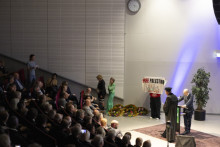Higher education is expected to be a 'plateau with peaks', secretary Hermans repeats in his exploration 'Learning without borders'. Although the quality of higher education is excellent at present, the Netherlands for the moment lack genuine top-institutes. In ten years this should be different. Dutch higher education should then be able to compete on quality with other countries, the secretary hopes. To that end different strategies are possible.
The first strategy gives students all the power. 'Hogescholen' and universities will not receive money directly from the state but via students. They will get a certain budget of 'learning-rights', which they can spend at all educational institutes which meet certain minimal quality standards. Educational programmes will have to compete among themselves for the favour of the students. Hermans thinks that students will then be prepared to pay more for real quality. Tuition fees can then be raised.
The secretary does want to prevent endangering the accessibility of such programmes. He sees a possible solution in the Australian model. A student there receives an extra loan which he pays back in taxes, depending on his income: a kind of academic tax.
The second strategy leaves everything more as it was. Universities and 'hogescholen' are financed by the government, based on results. How to reach those, is up to the institute. Educational programmes will get more possibilities to select students or to invest higher fees in educational quality.
Hermans also sees different scenarios for the future of research policy. He is considering keeping the universities out of dividing research budgets. Scientists can then appeal to research organisations to finance their research. In this scenario institutes should compete with each other to bring in the best researchers.
As an alternative Hermans considers linking financing research at universities and research institutes to scientific performance. An independent body to be established should judge the quality of the research.
Another proposition is to give businesses and social organisation tokens for research, which they can spend at universities and research institutes. This should result in more research relevant to society.
A discussion in society about the future of education and research should answer the question which scenarios should be implemented. Hermans emphasises the possibility that strategies can be combined.







